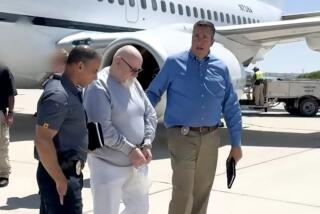‘Cold Case’ Link Helps Ease the Anguish
- Share via
If, as investigators say, a murder trail can grow cold in a matter of days, how cold can it get after 32 years?
And as those years go by, how can family members of a murder victim go to sleep each night with any realistic sense of hope, without wondering what happened and why? Without wondering if the feelings of sadness, anger and suspicion will ever go away?
Saundra Beaty knows how -- because that’s how long she, her mother and sister have waited to hear who authorities believe killed 23-year-old Marla Jean Beaty Hires in 1972. And to see the three women’s smiling faces in a newspaper photograph this week is to know that, at least for a time, some of the sadness can fade.
Orange County authorities say they made a connection in a DNA database and now think that an Ohio prison inmate named Edwin Dean Richardson killed Beaty. Prosecutors filed charges last week and said he’d be extradited. They don’t believe he knew Beaty and suspected that he preyed upon her at a strip mall.
And just like that, a veil hanging over Saundra Beaty partially lifts. A story that had no end now may have one.
“This is the last page,” says Beaty, who was 19 when her older sister was killed. “I see the end, I see the back cover of the book. I can feel it, I can almost see my sister smile.”
As devastating as a slaying is at the moment, imagine what a long-unsolved one could do to you. Think how long the pain lasts, how strong the hostilities can grow. In Beaty’s case, she lost a sister she was just getting to know as a woman instead of as a sibling.
That alone breeds a sense of loss. When it’s compounded by countless other emotions, life is irreparably altered. Beaty describes the first months after the slaying as a horrible fog in which she and her family members don’t remember how they did even mundane things like get to work or pay bills.
“Not just one person dies,” Beaty says. “It’s so traumatic, and it’s not like a plane crash or car accident. It’s the most horrendous.... You don’t trust anybody. The police don’t know who did it; it gets to you mentally, you question every male. Physically and mentally, I hated every male that I looked at. And I knew that was wrong.”
Marla Hires was married with a child when she was killed. She had been raped, strangled, wrapped up in carpet and rolled down an embankment in Yorba Linda. Beaty acknowledges she and others harbored suspicions about her former brother-in-law. Never close, they clashed over various things after the slaying and never made amends.
Now, Beaty knows that must happen. “Is it too soon?” Beaty says. “Yeah. But I want to make a phone call to him and clear the air. I have to apologize and say I thank God every day for DNA.”
The Beaty family, including Marla’s mother, who turns 83 on Thursday, now holds a special place of honor for Orange County Sheriff’s Department veteran investigator Larry Poole and other “cold case” detectives.
Saundra Beaty says Poole began their first phone conversation with, “Do you know how difficult you are to find?” She says she replied: “No, but is this a good thing?” It became a very good thing. The specter of a slain loved one never leaves you, but not finding the killer makes it worse. Authorities have told her, Beaty says, that the DNA evidence is conclusive.
And now that she can put a face and name with the case, there’s an inner battle still being waged. “I found characteristics in myself I’m not proud of at all,” Beaty says. “I could hurt this man a big toe at a time. It’s not a good thing. I wouldn’t want to do it fast. When they told me he was suffering [from emphysema], I said let him suffer as much as he can. But when you feel that in yourself, that’s not good.”
More to Read
Sign up for Essential California
The most important California stories and recommendations in your inbox every morning.
You may occasionally receive promotional content from the Los Angeles Times.










